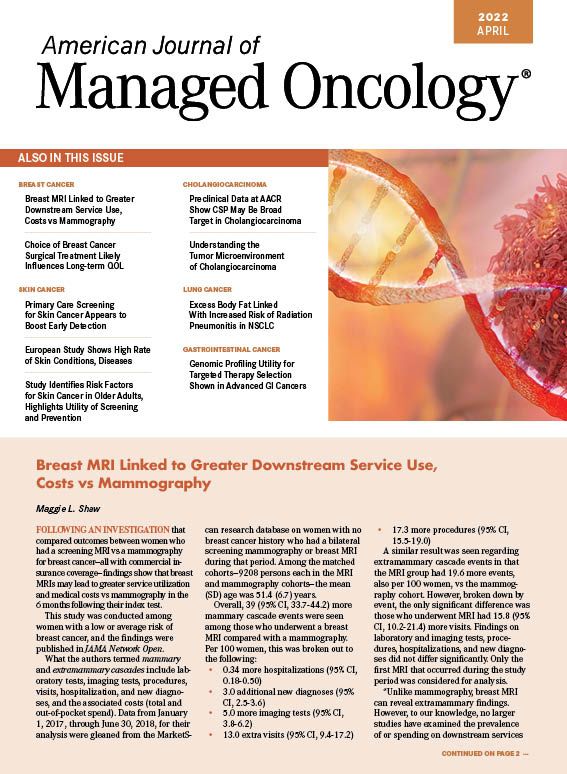- Center on Health Equity & Access
- Clinical
- Health Care Cost
- Health Care Delivery
- Insurance
- Policy
- Technology
- Value-Based Care
Preclinical Data at AACR Show CSP May Be Broad Target in Cholangiocarcinoma
Researchers presented results for ZB131, a monoclonal antibody that would target cancer-specific plectin (CSP); experiments with mice showed this may be present in more than 80% of the most common types of cholangiocarcinoma.
Preclinical data presented Tuesday at the American Association of Cancer Research (AACR) suggest an investigational therapy may be broadly effective in cholangiocarcinoma, a rare and deadly cancer that forms in the bile ducts.
Cholangiocarcinoma, which has several forms, can only be cured by surgery, which is not always possible; even then, cancer recurrence is the norm. The 5-year survival rate is below 20%. Recent advances include approval of targeted therapies, including FGFR2 and IDH1 inhibitors. Experts in the field encourage genomic testing to search for biomarkers, so patients might be enrolled in a clinical trial studying new treatments.
However, researchers from ZielBio in Charlottesville, Virginia, presented data they say show the possibility of a more broadly effective treatment. They presented results for ZB131, a first-in-class humanized monoclonal antibody that would target cancer-specific plectin (CSP), a protein that promotes tumor grown that is expressed exclusively on the cell surface.
“These findings further confirm that ZB131, currently in Phase 1 clinical trials, presents an exciting possibility for the treatment of CCA and other CSP-positive cancers,” Kimberly Kelly, PhD, CEO of ZielBio, said in a statement. “ZB131 has shown strong antitumor activity in vitro and in mouse models. Additionally, it has demonstrated an excellent safety profile with no toxicities identified in GLP-enabling toxicology studies in non-human primates.”
In their AACR abstract, study authors state that, unlike many biomarkers seen in cholangiocarcinoma, CSP presence was widespread in experiments with mice who were implanted with cancer cells. Using immunohistochemistry staining, investigators determined that intrahepatic cholangiocarcinoma was 92% positive for membranous plectin, while extrahepatic cholangiocarcinoma was 86% positive. This suggests that anti-CSP therapy, such as ZB131, “could be broadly effective” against cholangiocarcinoma, the investigators wrote.
In cholangiocarcinoma cell lines in vitro, the experimental therapy “arrests the cell cycle, inhibits cell migration, and triggers intracellular [reactive oxygen species] accumulation.” In the mouse model, the therapy suppressed tumor growth in 83% of the mice and caused regression in the remaining 17%.
Earlier data showed that CSP’s possible role in chemoresistance might make ZB131 effective with gemcitabine, which is currently used to treat cholangiocarcinoma. The investigators treated CSP-positive cells with combinations of gemcitabine plus ZB131 in vitro and found “pockets of synergy or additivity.”
According to the abstract, this combination produced 91% suppression in tumor growth compared with 74% when gemcitabine was used alone at day 32.
“Collectively, our results suggest that ZB131 renders [cholangiocarcinoma] tumors more chemosensitive and enhances the antitumor effects of gemcitabine,” the investigators wrote. Compared with current standard of care, “ZB131 showed remarkably low toxicity,” most likely because the antibody bypasses noncancerous cells.
Reference
Perez SM, Burton R, Krawitz D, et al. First in class drug ZB131 shows efficacy in cholangiocarcinoma models. Presented at: American Association of Cancer Research annual meeting; April 8-13, 2022; New Orleans, Louisiana. Abstract 3591. https://www.abstractsonline.com/pp8/#!/10517/presentation/11995

